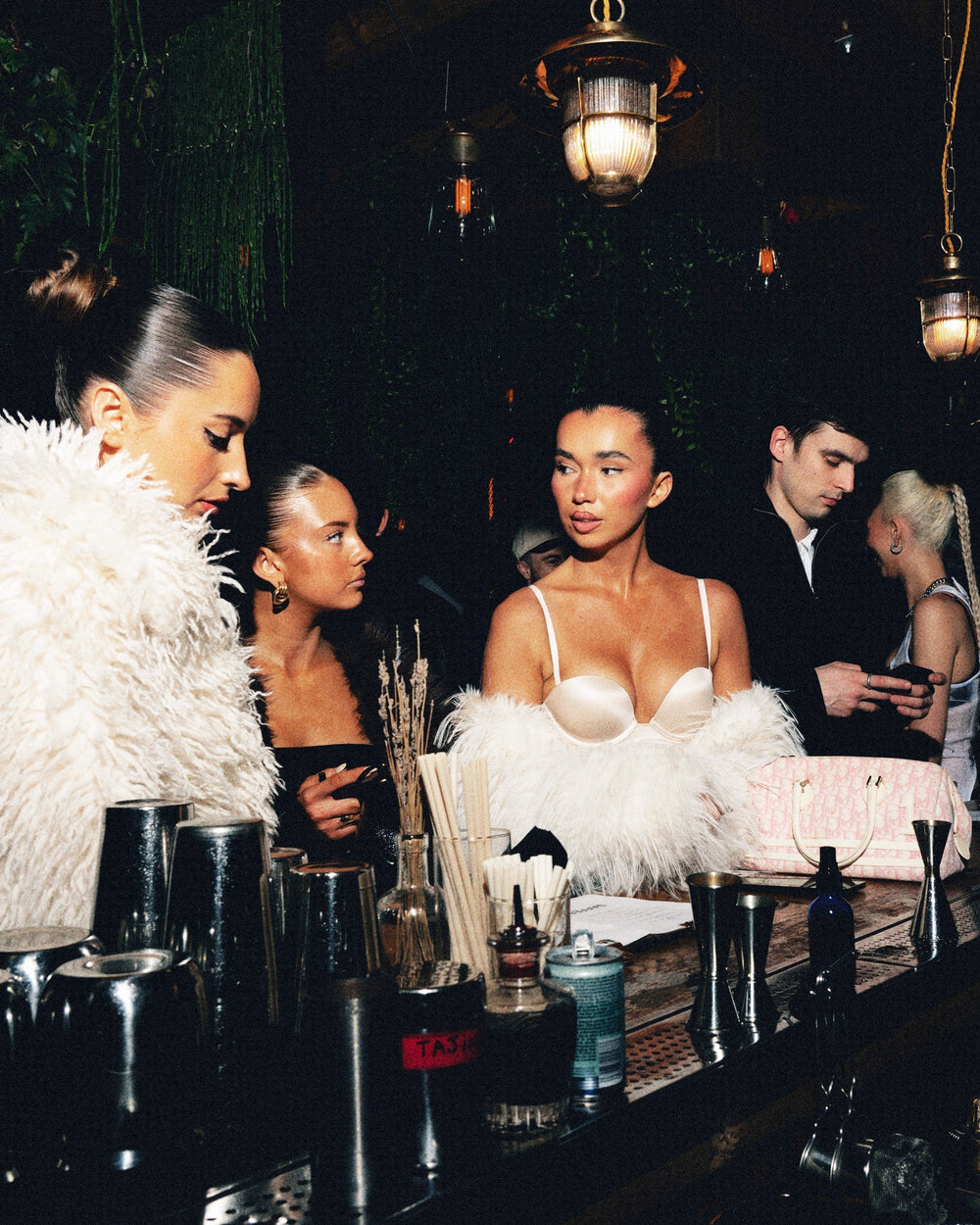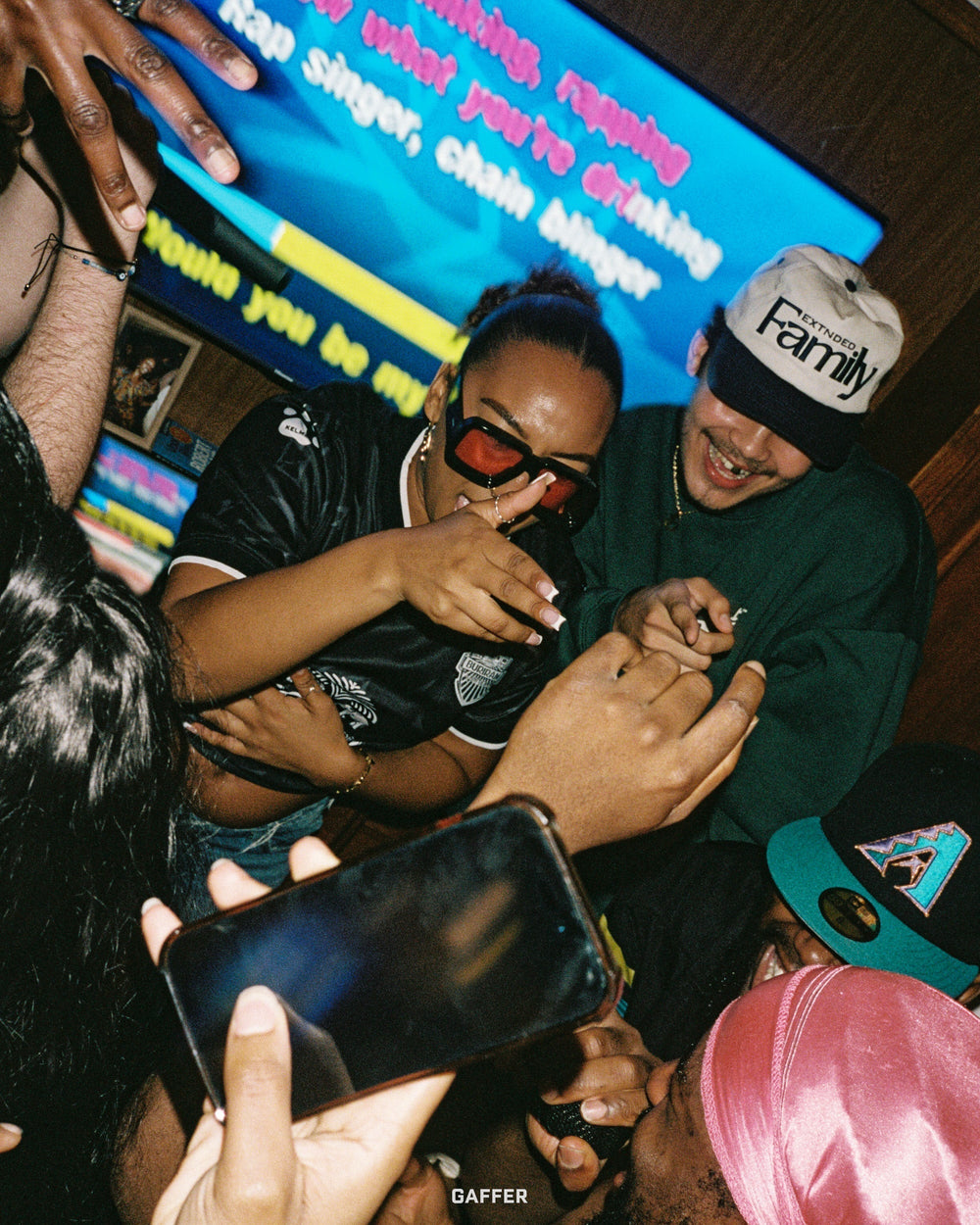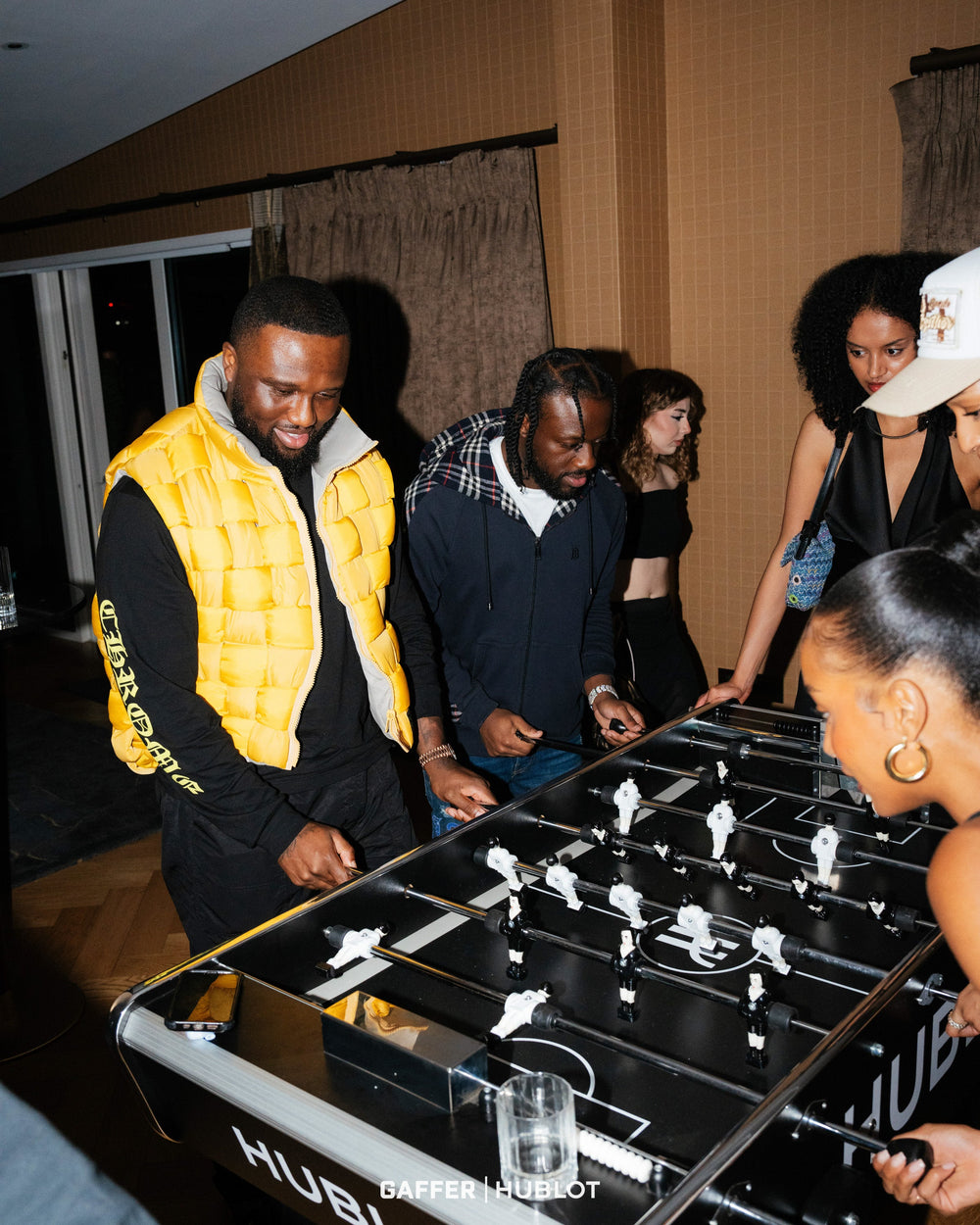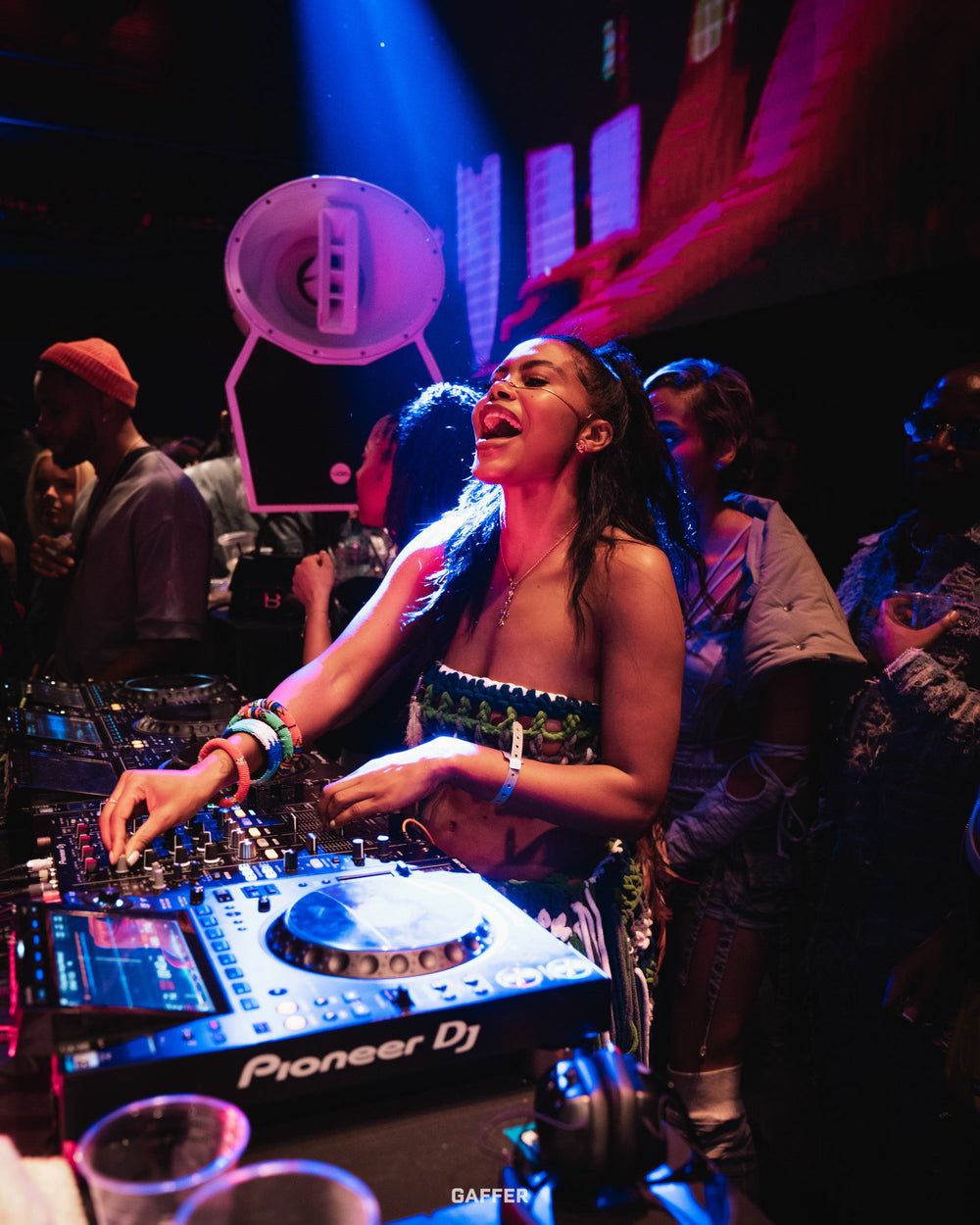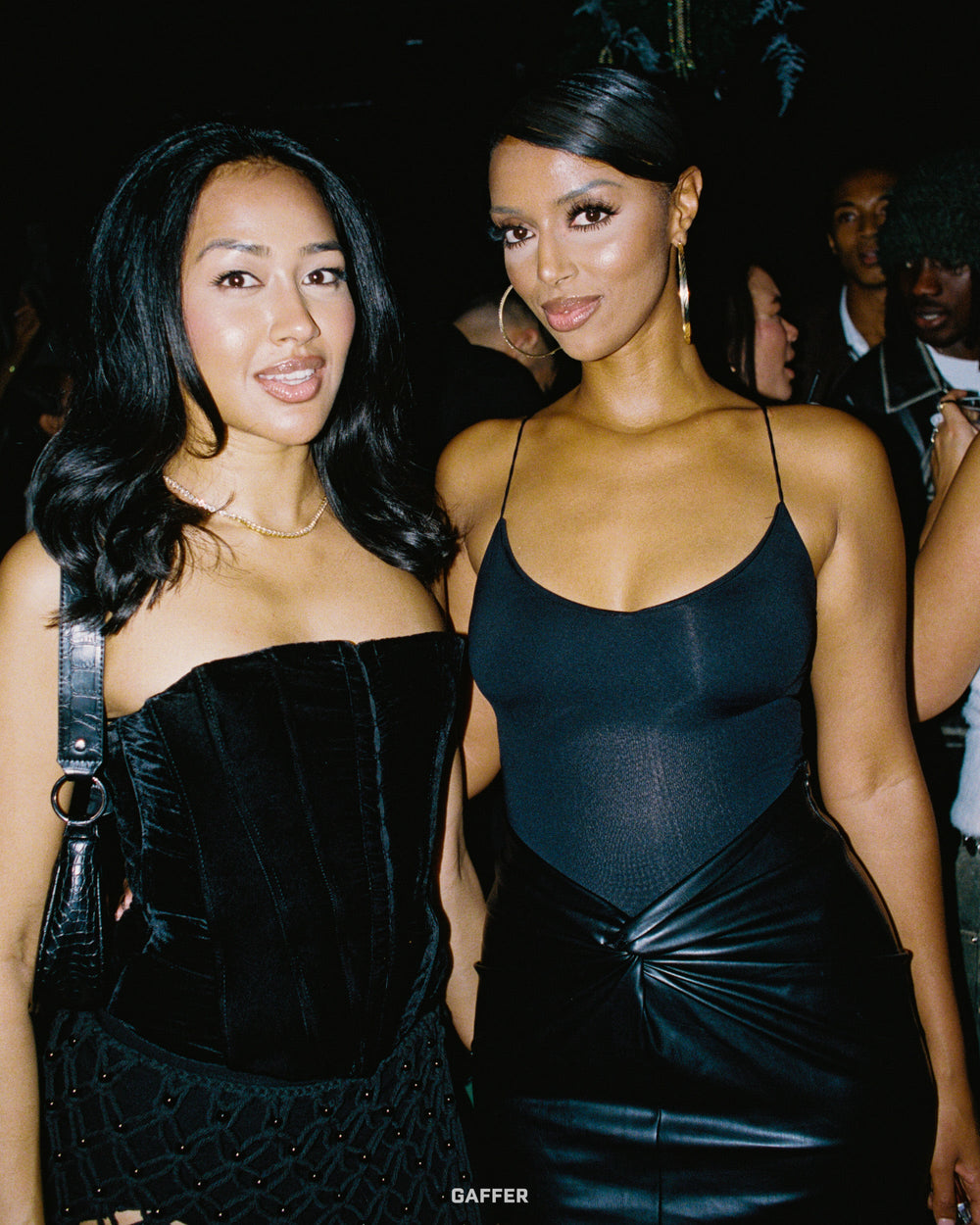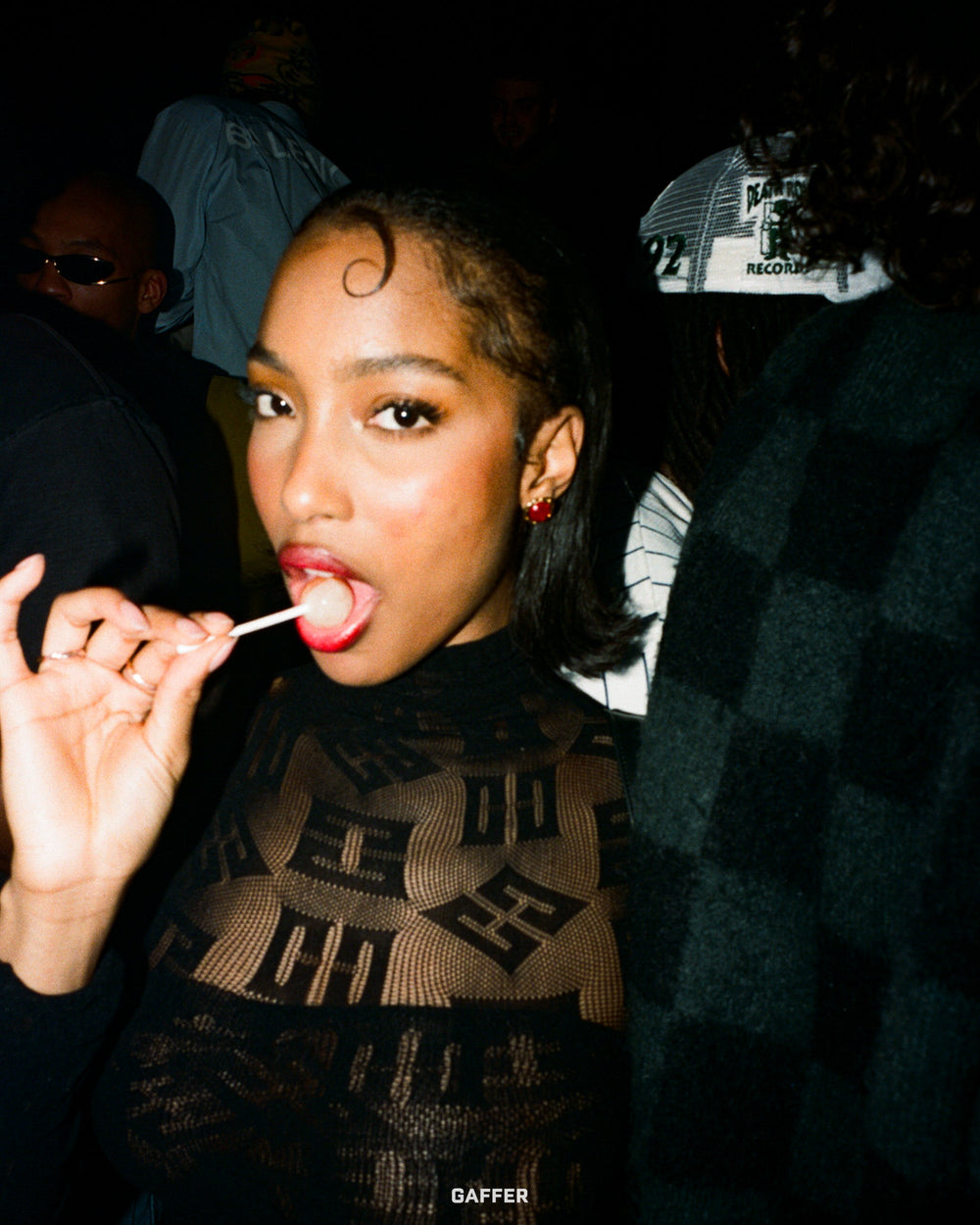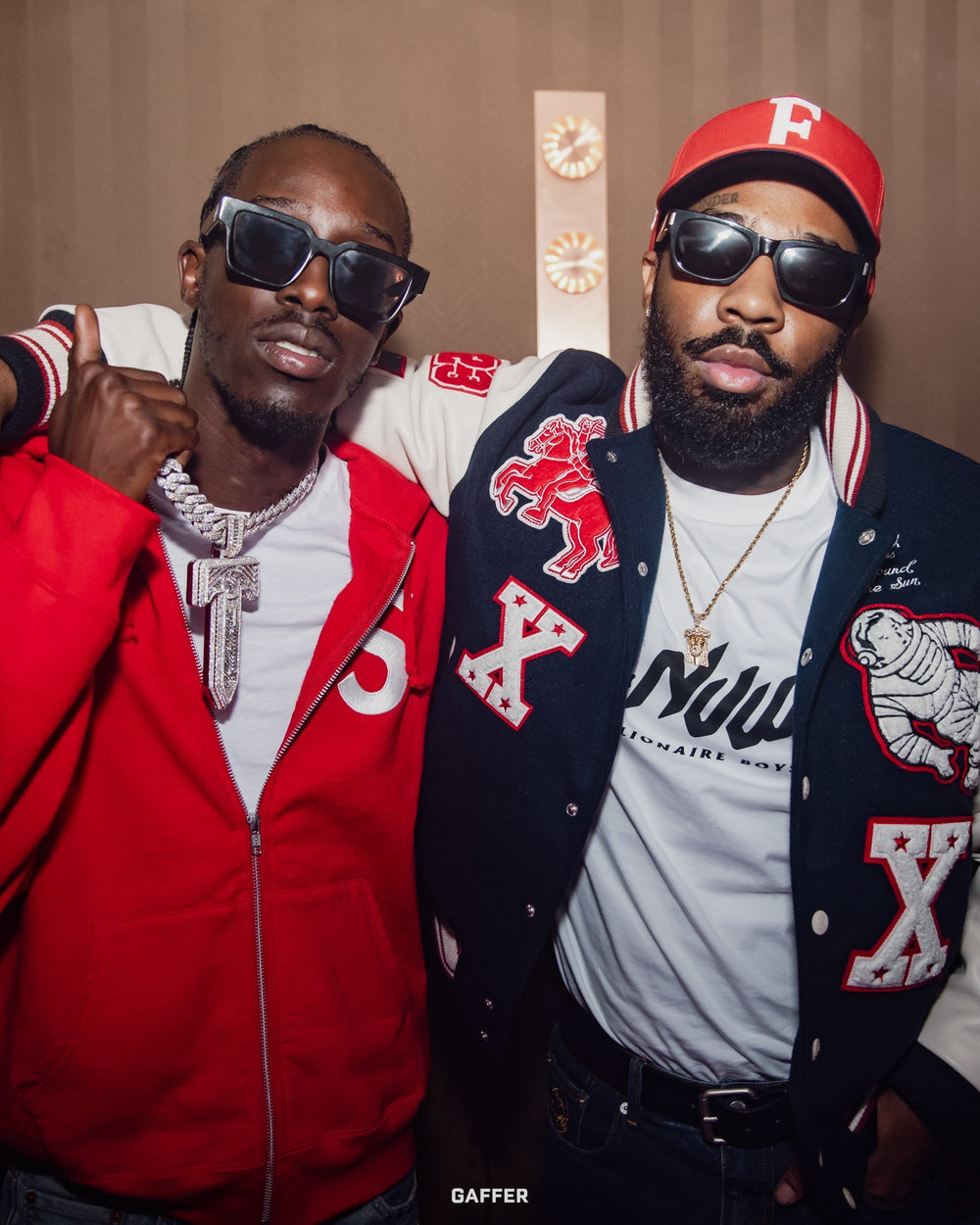David Moyes is famously cautious when bedding in players acquired from The Championship, meaning Benrahma hasn’t slotted straight into the team’s starting XI, but there is belief from fans and club alike that in Benrahma, West Ham finally have a worthy successor to the talismanic Dimitri Payet who departed back in 2017.
What’s most striking about our interview with Saïd is how endearingly humble and excitable he is. You might expect a player that carries himself with such a swagger on the pitch to conduct himself similarly off it. But Saïd the player, and Saïd the person, it turns out, are two very different people. When we ask who his hero was growing up, it felt natural that he would reel off an inspiring individual talent similar to himself, be that Hatem Ben Arfa or Adel Taraabt.
TOP & TROUSERS ALYX STUDIOS @ FLANNELS, SHOES PRADA
Instead Saïd tells us with all earnestness that his heroes growing up were his parents. If this were anyone else you might think this was a result of media training, but no. Benrahma conducts himself with the sort of humility that cannot be faked. Likewise it’s hard not to be taken aback when Saïd confesses that at one point he was unsure whether he had what it takes to turn pro, saying the idea only crystallised for him once he walked through the training ground doors of Nice, aged 18.
These are doubts that you might expect to hear from a player with less talent, but not from one that has turned humiliating defenders into his own signature art form. Saïd speaks with an honesty that is rare in the modern game. This is his story, as told by him.
So let’s talk about the rise of Saïd Benrahma, who was your hero growing up?
My parents, my mum and Dad, they were the ones that gave me the culture.
You mean in football or in general life?
I mean in general but yes in football too, they were so important. Both of them sacrificed so much for me and supported my progress since I was little. They were always taking me to games, always there for me emotionally, to encourage me, to give me strength. I think they’re my heroes.
LEFT: JACKET MONCLER X ALYX, TRACK JACKET DIOR, JEANS AMIRI. RIGHT: JACKET AND TROUSERS CASABLANCA @ FLANNELS, SHOES STOCKX
So tell us about your early life, you grew up living in Bethouia, Algeria, before moving to France at the age of 12, how was that?
It was really good. Like everywhere it has its highs and lows but I had so many good times in Algeria. It brings back a lot of good memories for me. It’s also where I started playing football. After that I moved over to join my mum in France and everything unfolded from there.
And how was life for you as the youngest member of your family, because you have six sisters is that right?
Yeah six sisters and a big brother. I’m the last one, I’ve always been the baby. So, yeah I’ve never had any real problems, I’ve always received so much love. My family has always given me so much and now I’m just trying to return the favour as I’ve just always been the baby, you know? So, that means I got what I wanted, always got the last bit of dessert! I definitely got spoiled and they really took care of me.
Was anyone particularly influential in introducing you to the game?
In a way not really, because in Algeria you find football for yourself. There is always a game taking place outside in the street that you can play in. Otherwise my Dad knew a thing or two about football, may he rest in peace. He encouraged me, gave me strength and believed in me. He let me play, always dropping me off and picking me up from training. In Algeria it’s really quite rare for a parent to do that sort of thing.
But my Dad always believed in me and trusted in me. If a game was far away, he would take me and we’d spend the day together. Just like two mates really.
How else did he support you at that stage?
He always really believed in me and let me just enjoy myself. He knew I loved football more than anything. He’d support me but it wasn’t like ‘do this’ or ‘do that’. He just let me enjoy it, ‘play your football’. When I misbehaved he always told me off but he knew how to do it with tenderness, in a way I could understand. Otherwise he gave me total freedom, like ‘enjoy yourself’, just play, if you succeed or not it doesn’t matter as long as you enjoy it. He was always there, and it’s a beautiful thing.
Can you remember the first time football made you feel something and made you want to become a footballer?
Well I used to watch games and naturally, that would make me dream. But to tell you the truth I didn’t think I would make it when I was a kid. It took me a long time to fully realise this dream. I’d watch games on the TV and want to be playing there one day but not believe it. I think it was only when I was 18 and signing for Nice that I actually believed I’d make it! Even when I got to Nice it was quite hard to believe.
So when did you realise you were a really good player?
Honestly, maybe three years ago. I knew I was good, I knew I had potential, that I could play, but I needed that confidence. So I knew I was a good player but did I ever think I’d make it to the Premier League for example? Honestly, never.
But that’s not lacking confidence so to speak, more just being humble…
No, honestly, I think it was a lack of confidence. Like I knew how to do certain things but in a game I would always tell myself ‘no.’ I was afraid, I felt on a leash. I’d always overthink, ‘do I try a pass here?’ But about three years ago when I was at Chateauroux, that’s where I fully realised my abilities. I really became conscious of my qualities and it was where I figured out the areas I was good at. I was able to develop those and from then on it became more relaxed, instinctive.
Since I’ve been in England and when I played at Chateauroux I’ve had that freedom and it makes you more confident. You become more aware of your abilities, you start telling yourself ‘I can do this.’ Then you start repeating them, becoming more consistent, and the next time it becomes easier.
What has Algeria, where you originally learned to play, given you in terms of your footballing identity?
In Algeria we love creativity. Really, we love technicians. When you’re technical it’s really something in Algeria. You can run 15 kilometers, you can have spirit, that’s all good, but if you can’t control a pass or if you can’t nutmeg someone, forget about it.
And how was it adapting your game from that to France?
When I came to France it was easy for me because I had that technique you focus on in Algeria. But tactically it was difficult and I had to learn and adapt, it could be difficult on a tactical level at first. You can be good on the ball but you’ve also got to be good without it. So it took me a little while to understand but now it’s better, I learned.
Moving to another country at the age of eleven is no small feat, for you and your family. How was that for you?
My mum was already there so I lived with her, she also lives with me now in London. Since moving to France we have done everything together. Even through the hard times, when we had to sleep at other people’s houses, she always found a solution, found a way to protect me and keep me happy. My mum sort of picked up the baton in terms of giving me that same support I had from my father in Algeria. She’s a lioness, a warrior and honestly, all I can do now is try to make her proud of me.
So for me, my Mum is my life. Honestly we’ve been through a lot together. We’ve had some hard times but God has helped us, and we’re as strong as each other. And I can only thank her and try to make her proud. Now that’s my only goal, to do well by her. My Father isn’t here, may he rest in peace. Now it’s just my mum, she’s my life, she’s everything
JACKET AND TROUSERS CASABLANCA @ FLANNELS
In France you started playing for local teams Balma and Colomiers. What do you think they saw in you?
In the beginning, when they first took me in I felt a bit outclassed as everyone was a year older than me. I didn’t feel entirely relaxed being in the first team. There was the first team and the second team. And I’d just arrived and they saw that I had some technical skill. So, they put me straight in the first team and I played a tournament but I didn’t feel at ease, I didn’t feel like myself.
So, I asked to be in the second team and I spent the whole season there. And they left me there, they didn’t want to recall me after that because they thought ‘who is this guy?’ So I enjoyed my time with the second team and the year after I went back up into the first team and I became the captain. I would have never expected that to happen but they gave me the captaincy
Actually, when I was at Balma you know what position they played me? I played at 6, 8…Or at 10 sometimes but more often at 6, with a 10.
And as a kid you were into Hatem Ben Arfa, right? Was he your idol?
Oh yeah, I grew up watching Hatem because I like that type of player. Since I was young I’ve always loved dribblers and magicians and Hatem was really something. For me it was only ever on a footballing level, others judged him off the pitch. Even sometimes at school I’d be getting into fights with people when I backed him, like ‘don’t talk to me about all that other stuff,’ for me it’s all about the football. He was incredible.
Let’s talk about your professional debut at Nice which happened when you were living in Toulouse. Was that a special moment for you?
It was awesome because I’d been on the bench the previous week, against Guingamp and I didn’t get in. So, I did the week’s training with the pros and my goal was to get in the main team. I tried to have a big week with the pros so they’d take me with them at Toulouse.
So I arrive in Toulouse and the assistant tells me ‘Make yourself at home.’ The coach already knew I lived in Toulouse. The assistant tells me ‘This is your home’ and all this, so straight away there was already that trust.
I went to the match and it was funny when I first got there. I was visiting the grounds and there were all the security guards. And out of coincidence I knew one of the security guards, he slept at mine.
You were neighbours?
No no we lived together, as flatmates! When I first got to France. But it was mental, I heard ‘Saïd, Saïd!’, I look up and think ‘No way.’
I was shocked, it was a beautiful coincidence. So yeah that was wicked. Then the match happens, and we’re losing 1-0. So the coach brought me on, and people were shocked because already afterwards people were sending me videos. Like filming my entrance going ‘Ah it’s Benrahma!’
‘It’s Saïd!’
So it was funny, it was magnificent. My whole family was there that day, too. It was a good debut. In fact, it was beautiful, I mean obviously we didn’t get the win, but for me, as my first professional match, it was great. I couldn’t have dreamt it any better.
Now let’s talk about your mentality and some of the challenges early on in your career, When you were on loan at Angers, Ajaccio, Chateauroux, what was your motivation? Because it must have been a strange time for you as a player.
It was very difficult. Nice didn’t think they could count on me so I found myself in a situation where I felt like I was playing musical chairs.
They decided to put me on loan and for six months they basically threw me aside. That was hard. I went to Ajaccio. I’d previously been on loan at Angers and when I came back the new coach didn’t want me. So I had to accept that. It’s difficult but it’s football and sometimes you can’t please everybody.
So yeah I accepted that and I spent six months in the C.F.A. I had a coach who helped me mentally, who gave me belief when I needed it most. Then Nice loaned me to Ajaccio, it was going well, honestly it was beautiful and I was made very welcome.
The president and sporting director of Ajaccio really made me feel so welcome.I really felt like I was at home, and I needed that.
So I did my six months and then went back to Nice. When I get back the same thing happens, the coach can’t fit me in. I’m waiting and I just wanted to leave since they didn’t want to count on me. And I remember, my old agent rang me up and told me I’ve got a project for you’ I tell him ‘Okay…’
I knew what he was proposing, and honestly it wasn’t really what I was looking for. But sometimes it’s the things you least expect that turn out the best. So we’re on the phone and he’s telling me about this project. He tells me, Chateauroux. I knew about Chateauroux because I’d played against them at Angers but I didn’t really know them. Never in my life had I set my targets on Chateauroux, honestly.
So I went there. When he called I was at Montpellier. And he’s telling me ‘You’ve got to go now’ so I go back to Toulouse, I grab three suitcases. And I set off the very next morning. It was a 4 hour drive.
Man when I think about it…it’s crazy. I’m driving there and asking myself ‘where on earth am I going?’ Just speaking to myself like, ‘I’m going to Chateauroux, if I can’t make it here then it’s over for me I mean really! Just driving, telling myself ‘If I can’t make it work at Chateauroux then I’m finished.’
But Chateauroux had just been promoted to Ligue 2 so I thought I might as well. An, you know, arriving at a pro club for the first time and getting the number 10 shirt isn’t too bad really. So there was a little bit of pressure there. But I arrived and thought ‘I’ve got nothing left to lose, I’ll just play my football. ‘I’ll just do what makes me happy, what makes me Saïd.’
It all worked out. Whilst playing there I met my best friend, who also played for Chateauroux. He gave me additional support because he’s actually from there, So he was giving me all the inside tips, the ins and outs, how it all worked. We were inseparable and he really helped me out at the time.
HOODIE & TROUSERS SAÏD’S OWN
But during that time, where did your desire come from?
Well success is built on failure. In your life, if you can’t live with failure and move on then you’ll never go forward. So in my mind, you’ve got to accept that you can’t please everyone. And I’m not listening to what people might say. Because people sometimes just want to throw a spanner in the works. And they can sometimes stop you from dreaming
Everyone can dream, let me dream. Let me enjoy it, if I want to dream, if I want to be the best player in the world. Then I’ll dream it, it’s my dream, it’s between me and myself.
You’re not going to let someone else tell you that you can’t. Who are you to tell me that I can’t? Even if I don’t get there at least I’ll have tried. I’ve always thought that without failures you’ll never get anywhere in life. That’s what drives you forwards.
And that’s where Brentford came in, what gave you the confidence to move there when Ligue 1 was something in your comfort zone?
Angers, Ajaccio and Chateauroux were all beautiful clubs but it did feel at times like I was plummeting. But once I was at Chateauroux I think that’s where I had a mentality shift. I began thinking, what did I have to lose? I began trying more things. By the end of my time on loan at Chateauroux I had an offer from Nice to extend my contract but I wasn’t loving their terms.
Well for a start there was a chance that Nice might loan me again. I’m not crazy, I don’t want to be trapped in a loan cycle. And then here comes Brentford who backed me 100%, and when they spoke to me I could feel that they really wanted me. I came to London to check out the club and honestly, as soon as I arrived and spoke to them and heard what they wanted from me I was sold. Because the other choice was having to stay in the sidelines in Ligue 1. So I chose to come to Brentford and it was the best choice of my life, thank god I went there, they delivered on all the promises they made me.
What makes The Championship such an exciting and appealing option for players from around the world?
Well you know what, in the past year I’ve had calls from Ligue 1 players telling me they want to come to The Championship. They want to come to London, they want to come to the league, which has now become quite publicised and well regarded. Beyond that it’s England, you know. It’s a footballing country, everyone loves it here. You can watch League One, League Two, take your pick. And that’s the beauty of England, it’s exciting. But I didn’t know anything about The Championship, not a single thing, before I arrived in England.
Let’s speak about your work with the national team, you were first called-up in 2015 when you were still at Nice, how was that?
I’ve never told this story but the first time I got selected. I was coming back from training and I was with Alassane Pléa and his mates, as he used to give me lifts home. I got a call from a number I didn’t recognise and around this time I was getting a lot of calls from agents so this guy calls and gives me his name but I’m not really listening. I couldn’t really hear him. So I’m like ‘Ok fine fine’ and then I hear about all this Algerian federation stuff. I wasn’t expecting it all so I asked him ‘excuse me what’s your name again?’. He tells me ‘Christian Gourcuff’ (the Algerian national manager at the time) and it dawns on me that this isn’t a joke, I’m really going to play with Algeria. So he asks if I can be a part of the squad and I was like ‘you don’t even need to ask me! I’m on my way!’
You’ve mentioned before that playing for Algeria is not like playing for other national teams. What makes playing for Algeria so unique?
In Algeria we’ve just got such incredible fans. Obviously I would say this because I’m Algerian but the fans give us so much strength. I get the impression that only we can bring that kind of intensity. Of course others love their country, fine, but it’s not the same belief they give to us. When Algeria plays, the whole country comes to a standstill. It’s in our DNA to be proud, it doesn’t matter if it’s football, basketball, dance, whatever, if you see an Algerian doing well it gives you a special pride. I think few countries have that.,/p>
You speak so passionately about your father, how are you trying to fulfil his legacy in your day to day?
I’m not saying this because he was my dad, but he was perfect. He was a real example. Every day I think about him and it’s hard. It’s hard because he gave me so much, and he knew how to speak to me and there’s no one better, apart from my mum. But without him, I’ve sort of lost my bearings. He knew how to put things to me, he was someone who knew how to speak with gentleness in a way that always made you understand and that’s what I’ll miss the most.
What was the most important thing he taught you?
Taking pleasure from football. But other than that it’s all about respect. Stay on the right path, respect others and they will respect you, no matter who you are.
Finally, do you think the unique route that you’ve taken to the Premier League, from Algeria to France, followed by a number of tough loans before, gives you a greater determination to succeed?
I haven’t even done anything yet but to have got to where I am now, in the Premier League, it’s beautiful. Like I said, you’ve always got to dream. I didn’t always believe in myself and the Premier League seemed so far away it felt impossible to realise.
Sometimes you’ve just got to go for it. Don’t think about it, just play. It’s all in your head, your mentality. Who you surround yourself with, how you think. That’s what allows you to overcome obstacles and you’ve got to live with your failures in order to move forward. I think that’s what’s got me here. I’m happy, I’m in the Premier league and I’m going to try and stay here for as long as possible. You’ve got to believe in your dreams. Because if you don’t believe in them, who will?











